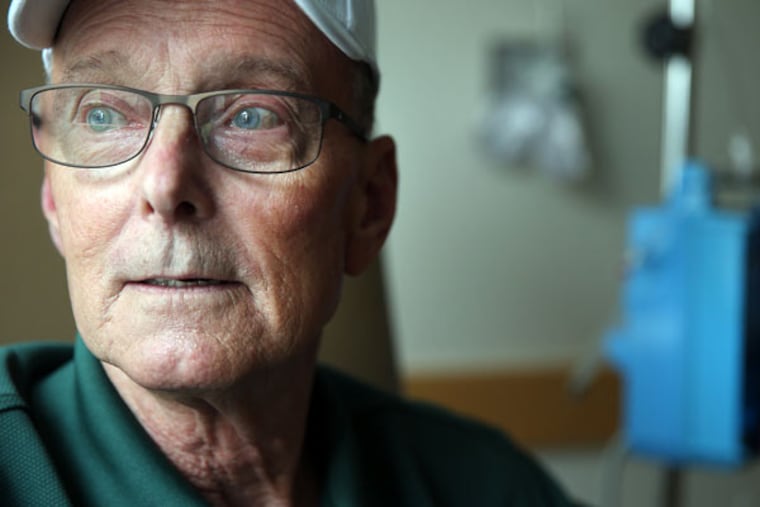Bill Ludwig, patient who helped pioneer cancer immunotherapy at Penn, dies at 75 of COVID-19
The South Jersey man beat end-stage cancer with a breakthrough immune therapy. But he couldn't beat the pandemic.

Bill Ludwig was losing his decade-long battle with an insidious type of leukemia when he became the inaugural recipient of an experimental immune therapy being developed at the Hospital of the University of Pennsylvania.
“I didn’t hesitate, because I had no options left,” Mr. Ludwig told The Inquirer in 2015. “And also, these people at Penn had been so wonderful to me and my family for 10 years. I felt obligated to say yes. Did I ever think it would be successful? Not in a million years.”
Mr. Ludwig, 75, died of COVID-19 pneumonia on Jan. 31 at the same hospital where, nearly 11 years ago, he became a watershed advance in personalized medicine. His own genetically engineered T cells permanently wiped out his end-stage chronic lymphocytic leukemia.
“He was just an all-around good person,” his wife, Darla, said Tuesday from their home in Bridgeton, N.J. “To think he died of COVID and not the cancer! His last two months were so sad. But [Penn] gave him an extra 10 years that we prospered from.”
Carl June, the Penn researcher whose lab pioneered what is now Novartis’ Kymriah, the world’s first T-cell cancer treatment, saluted Mr. Ludwig’s courage.
“Bill Ludwig was a pioneer who selflessly volunteered to be Patient #1,” June wrote Tuesday in an email.
“All of the clinical team and scientific team involved in his care are forever grateful for his altruistic generosity and we will miss his friendship dearly,” said June, who was laid low by COVID-19 for three weeks early last year.
Born and raised in Springfield, Ill., William Paul Ludwig joined the U.S. Marine Corps in 1962, right after graduating from high school. His regiment was deployed to Cuba in response to the 1962 missile crisis, the most dangerous confrontation between the United States and the Soviet Union during the Cold War.
After six years in the Marines, Mr. Ludwig was hired by the New Jersey Department of Corrections, eventually becoming a captain at the Bayside State Prison in Leesburg. He had been on the job for 30 years when he was diagnosed with leukemia in 2000. The chronic form that he had is rarely cured, but it can usually be controlled for years with intermittent chemotherapy.
“He’d do chemo and go to work the same day,” his wife recalled. “He just felt he had a job to do, and did it.”
In 2007, he retired, increasingly debilitated by the cancer.
“We knew he was going to die,” his wife said. “Then his doctor told him about the clinical trial.”
The T-cell therapy erased all signs of cancer in Mr. Ludwig and the second patient, and put a third into remission. But those early successes also showed the dire risks of manipulating the immune system into sudden overdrive. Mr. Ludwig barely survived the treatment as his body struggled to eliminate an estimated seven pounds of dead cancerous blood cells.
“I was in intensive care, with all my major organs shutting down,” he said during the 2015 interview. “My lower extremities were twice the size they should have been. They called my wife and said, ‘He’s not going to see the sunrise.’”
Instead, he left the hospital a month later, weak and skeletal, but cancer-free.
Years later, it became clear that the effectiveness of the T-cell therapy depended largely on the type of leukemia. The costly, complex treatment led to lasting remissions in most children and adults with a fast-growing form, but it did not work in most advanced CLL patients. Mr. Ludwig was disappointed that only about a quarter of patients like him shared his phenomenal outcome.
“I figured if they can cure me, they can cure everyone,” he told The Inquirer in 2018, then hastened to add: “They’ve never said ‘cured.’ But ‘cancer-free’ works for me.”
Mr. Ludwig and his wife made the most of his windfall decade of life. The septuagenarians bought a motor home and toured the country. They learned to whitewater-raft and ride horseback. They romped with dogs Maddie and Fozzie. And they celebrated — holidays, births, graduations, weddings— with their huge extended family.
Mr. Ludwig is survived by two sons, Paul and Stephen; two daughters, Carol Ludwig and Neely Buscemi; a sister, Joyce Sonntag; a brother, Tom; 13 grandchildren; and several great-grandchildren.
A memorial service, limited by pandemic precautions, was held Feb. 12. Donations in his memory may be made to the Center for Cellular Immunotherapy Fund, 3535 Market St., Ste 750, Philadelphia, Pa.